
the structure of the human ear and its major parts labeled in this diagram are shown
The main afferent system is composed by olfactory fibers that run within the stria medullaris thalami. The habenular complex receives these fibers, which are derived from the septal region, hypothalamus, and the amygdala. The stria medullaris thalami is a band of fibers arching on the upper part of the medial surface of the thalamus, passing.

The dorsal diencephalic conduction system, with the stria medullaris,... Download Scientific
The stria medullaris (SM), (Latin, furrow and pith or marrow) is a part of the epithalamus and forms a bilateral white matter tract of the initial segment of the dorsal diencephalic conduction system (DDCS). It contains afferent fibers from the septal nuclei, lateral preoptico- hypothalamic region, and anterior thalamic nuclei to the habenula.

Case MU 6664. In section 1900 the extensive demyelination of the stria... Download Scientific
The stria medullaris, also known as stria medullaris thalami, is a fiber bundle containing afferent fibers from the septal nuclei, lateral preoptic hypothalamic region, and anterior thalamic nuclei to the habenula. Pineal Gland.
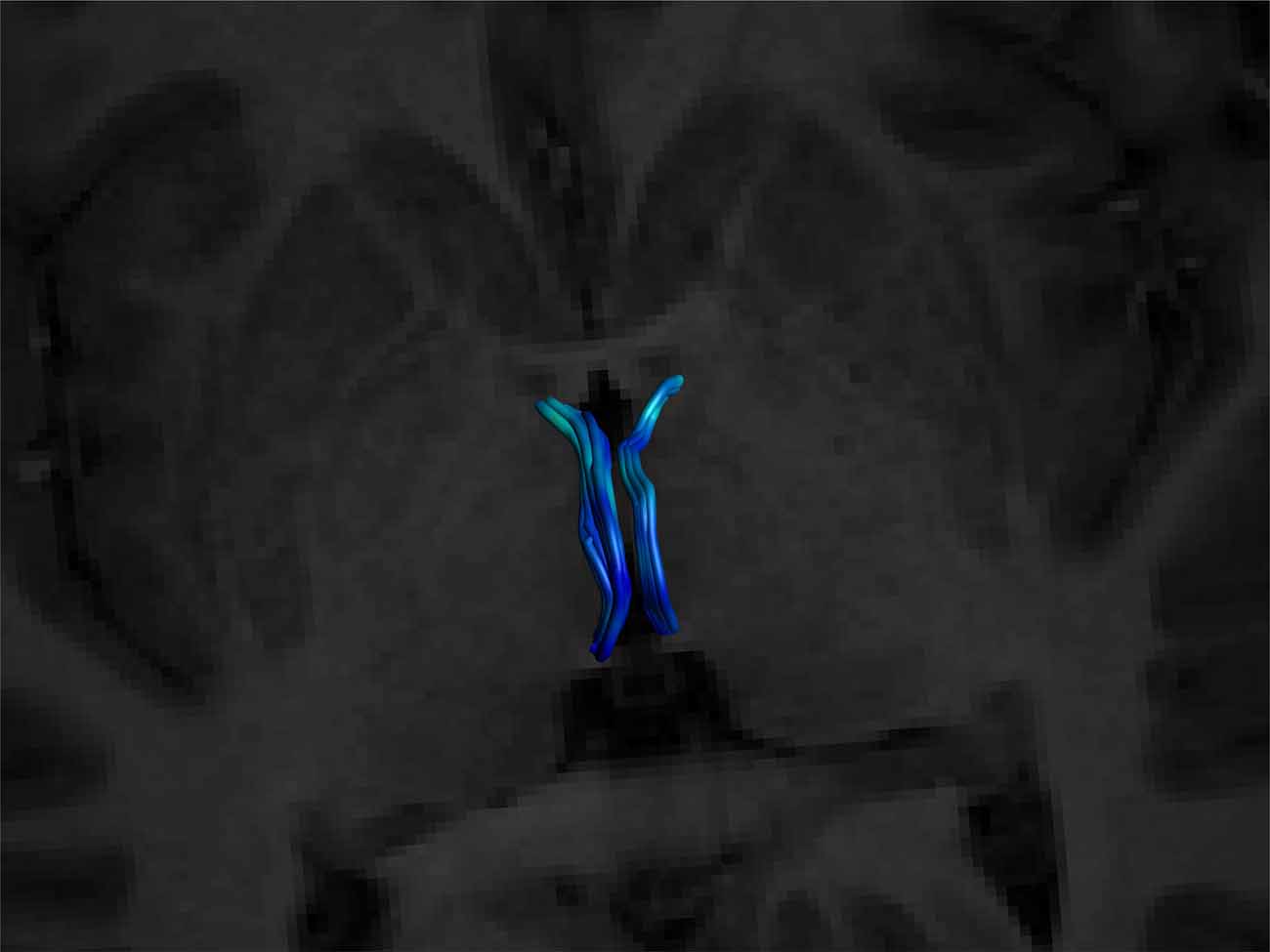
Frontiers Awakening Neuropsychiatric Research Into the Stria Medullaris Development of a
The Stria medullaris (SM) Thalami is a discrete white matter tract that directly connects frontolimbic areas to the habenula, allowing the forebrain to influence midbrain monoaminergic output. Habenular dysfunction has been shown in various neuropsychiatric conditions.
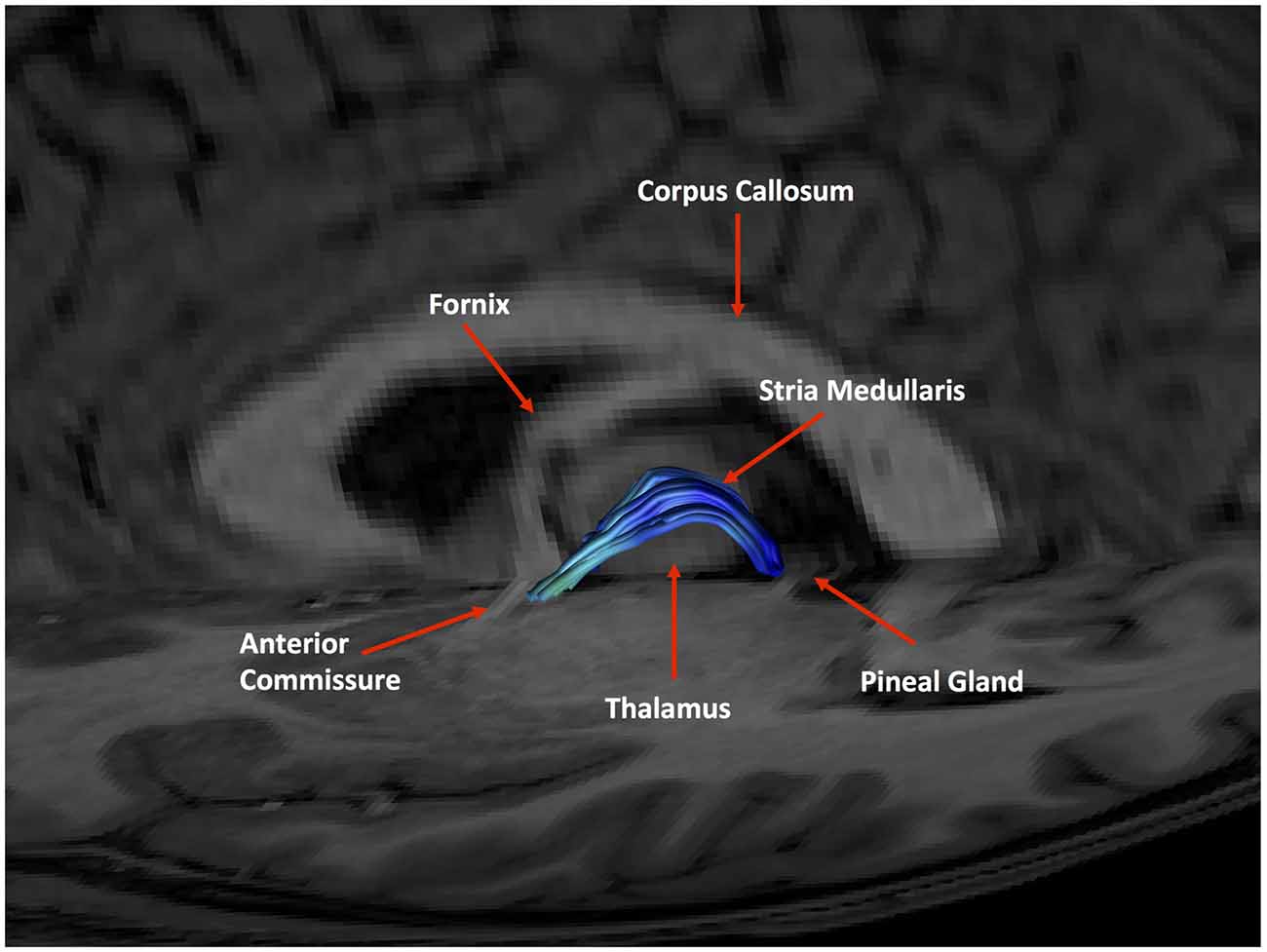
Frontiers Awakening Neuropsychiatric Research Into the Stria Medullaris Development of a
The septal area also projects to the habenula nuclei via the stria medullaris thalami and the anterior hypothalamus. Hypothalamus. The hypothalamus lies at the center of the limbic system and is at the confluence of many neural pathways. It is subdivided from anterior to posterior into three zones: the supraoptic region, the tuberal region and.
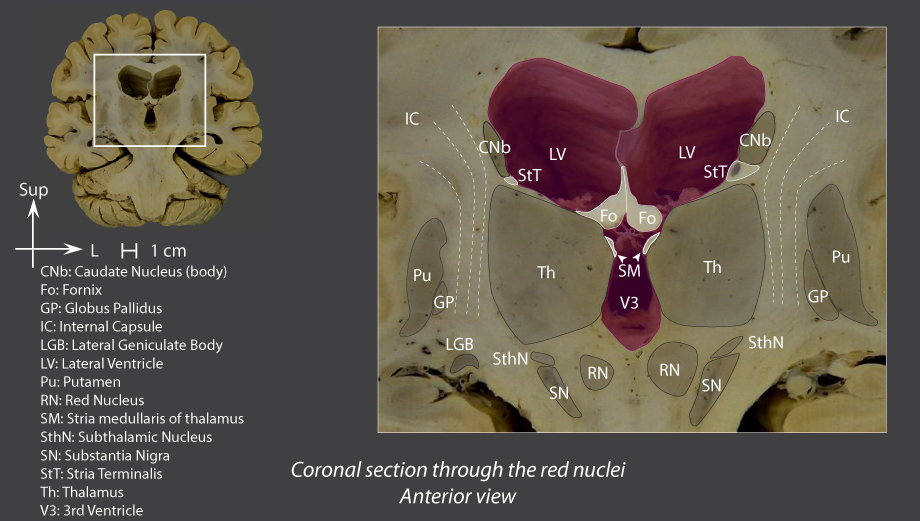
Dorsal thalamus Braininteratlas
Identification of the stria medullaris thalami using diffusion tensor imaging Identification of the stria medullaris thalami using diffusion tensor imaging Neuroimage Clin. 2016 Oct 26;12:852-857. doi: 10.1016/j.nicl.2016.10.018. eCollection 2016. Authors Ryan B Kochanski 1 , Robert Dawe 2 , Daniel B Eddelman 1 , Mehmet Kocak 3 , Sepehr Sani 1
stria medullaris 4th ventricle
Abstract Background: Little is known of its significance, especially in regard to functional pathways. Probabilistic diffusion tensor imaging (DTI) has recently been used to seed the lateral habenula and define its afferent white matter pathway, the stria medullaris thalami (SM).
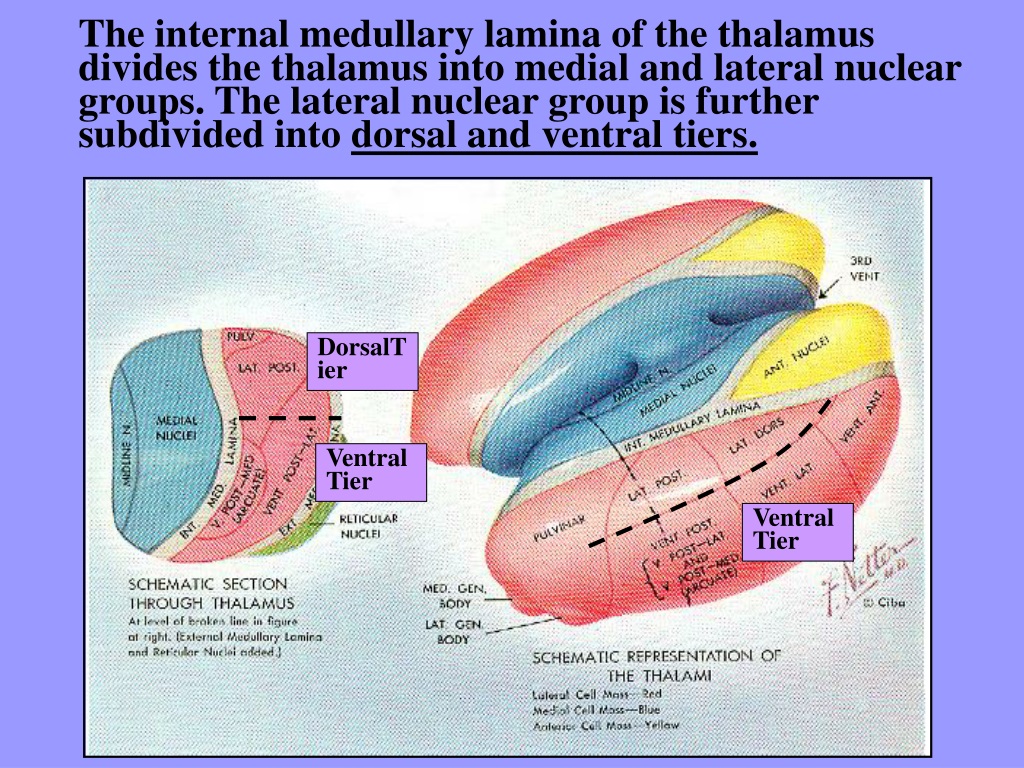
PPT Thalamus PowerPoint Presentation, free download ID9508009
A bundle of fibers called the stria medullaris thalami are located near the junction of medial and superior (upper) surfaces. Lateral Surface. The lateral surface of the thalamus is covered by a layer of myelinated fibers called the external medullary lamina which separates the lateral surface from the reticular nuclei.

DIENCEPHALON David Kachlík Petr Zach diencephalon
The pineal gland, habenular nuclei, and stria medullaris thalami are the principal components of the epithalamus ( Figs. 15.2, 15.4, and 15.15 ). The pineal gland consists of richly vascularized connective tissue containing glial cells and pinealocytes but no true neurons.
/images/library/2065/CY1FbBNvoPm9auinc5GlSw_Thalamus_01.png)
Thalamic Nuclei Connections, Functions & Anatomy Kenhub
Stria medullaris thalami - e-Anatomy - IMAIOS Human anatomy 2 Human body Parts of human body Regions of human body Musculoskeletal systems Visceral systems Integrating systems Endocrine glands Cardiovascular system Lymphoid organs Nervous system Central nervous system Gray matter White matter Reticular formation Ependyma Meninges Brain Cerebrum
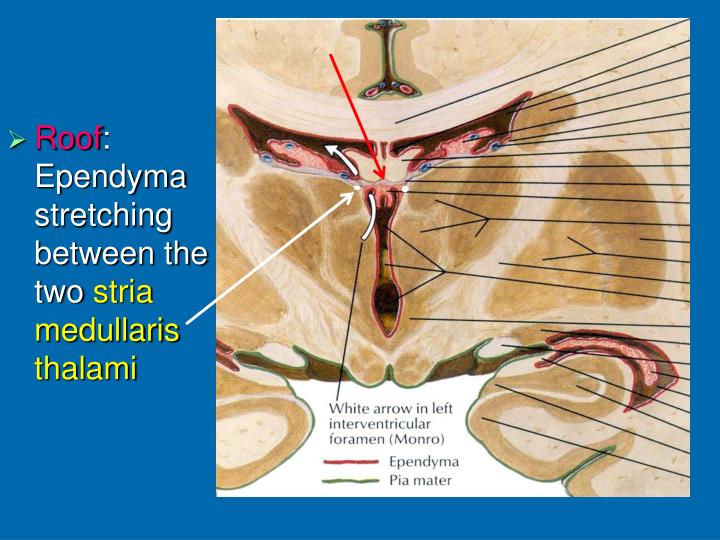
PPT Subthalamus & Hypothalamus PowerPoint Presentation ID1159156
It lies most medially and adjacent to the AV but is separated from AV, the stria medullaris thalami, and the ventricular surface of myelinated fibers and a glial lamella. Our results show that the.
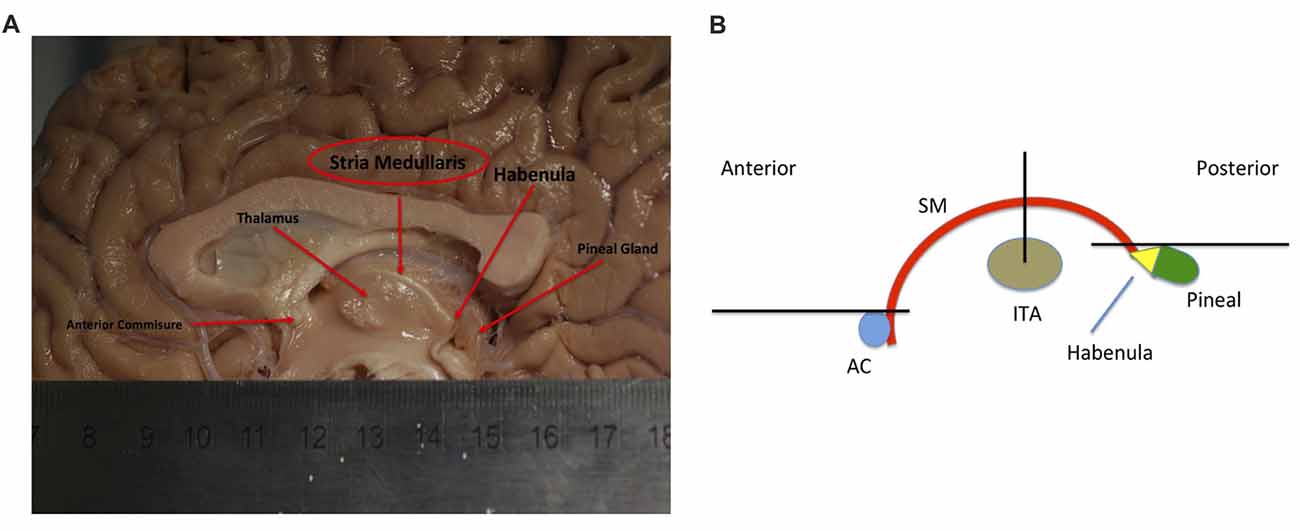
Frontiers Awakening Neuropsychiatric Research Into the Stria Medullaris Development of a
The Stria medullaris (SM) Thalami is a discrete white matter tract that directly connects frontolimbic areas to the habenula, allowing the forebrain to influence midbrain monoaminergic output. Habenular dysfunction has been shown in various neuropsychiatric conditions.

Thalamus Anatomy, Location, Structure, Function & Physiology
Recent literature has implicated the cortico-striatal-pallidal-thalamic loop in the pathophysiology of MDD which implies that stimulation of an afferent white matter tract like the SM modulates a node within a broad network involved in the pathophysiology of mood disorders ( Downar et al., 2016
Pixelated Brain Module 2, Section 2 Dorsal views of the brainstem
This nucleus communicates with the rest of the limbic system via the stria medullaris thalami (along the midline of the roof of the third ventricle). Habenula 1/2. Synonyms: none. In addition to connecting the Habenular nucleus to the hypothalamus, it also connects it to nuclei of the septum (septal area).

Dorsal thalamus Braininteratlas
The stria medullaris is a fiber bundle containing efferent fibers from the septal nuclei, lateral preoptico-hypothalamic region, and anterior thalamic nuclei to the habenula. It forms a horizontal ridge on the medial surface of the thalamus. Incoming Links Related articles: Anatomy: Brain (advertising) ADVERTISEMENT: Supporters see fewer/no ads

(A) Transverse brainstem section. Stm stria medullaris; VIIIh main... Download Scientific Diagram
Some of those fibers turn backward to enter the stria medullaris thalami and reach the habenular nuclei. Fibers from the dorsal fornix reach the splenial gyrus and the gyrus cinguli; Learn everything about the fornix anatomy and function with our articles, video tutorials, quizzes and labeled diagrams.